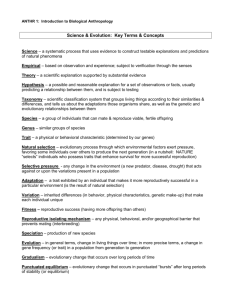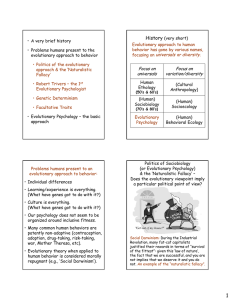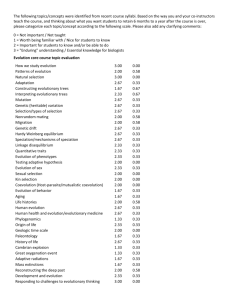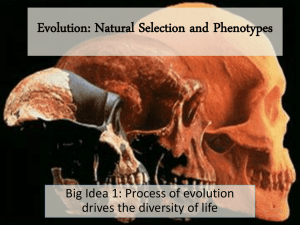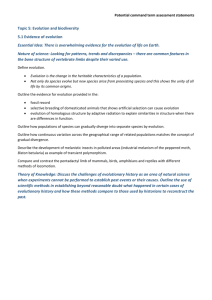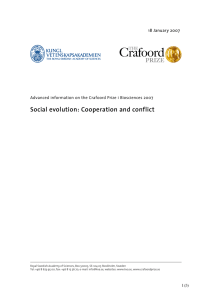EP intro
advertisement
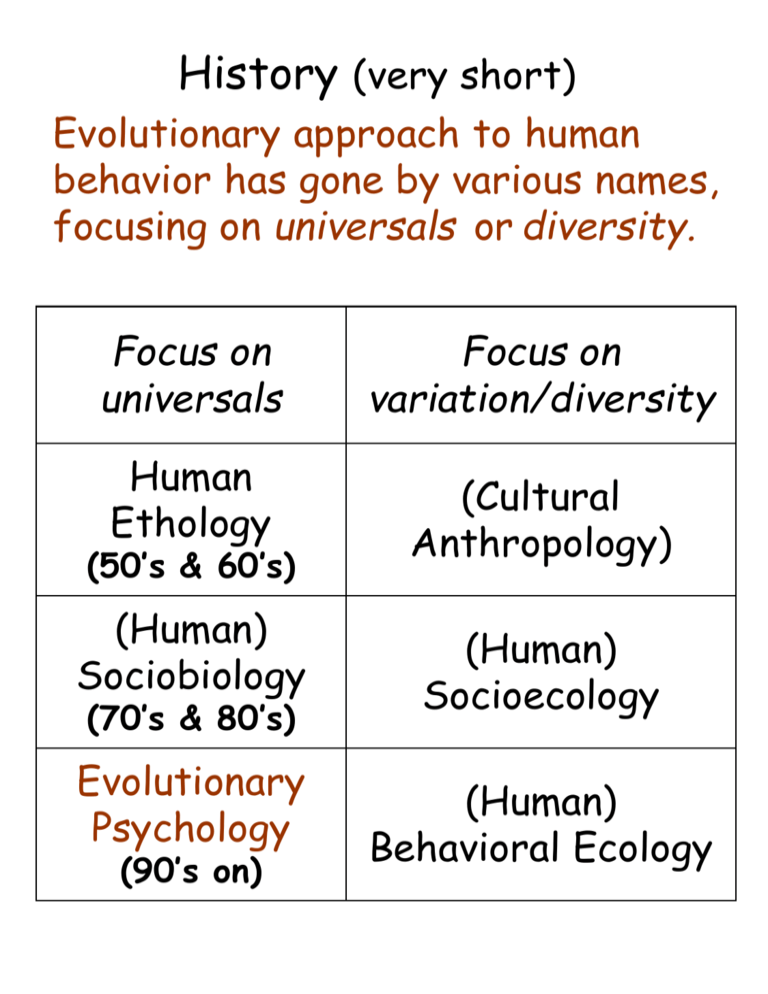
History (very short) . Evolutionary approach to human behavior has gone by various names, focusing on universals or diversity. Focus on universals Human Ethology (50’s & 60’s) (Human) Sociobiology (70’s & 80’s) Evolutionary Psychology (90’s on) Focus on variation/diversity (Cultural Anthropology) (Human) Socioecology (Human) Behavioral Ecology Problems humans present to an evolutionary approach to behavior: • Individual differences • Learning/experience is everything. (What have genes got to do with it?) • Culture is everything. (What have genes got to do with it?) • Our psychology does not seem to be organized around inclusive fitness. • Many common human behaviors are patently non-adaptive (contraception, adoption, drug-taking, risk-taking, war, Mother Theresa, etc). • Evolutionary theory when applied to human behavior is considered morally repugnant (e.g., ‘Social Darwinism’). 1975 Allen et al: Against “Sociobiology” “What we are left with then is a particular theory about human nature, which has no scientific support, and which upholds the concept of a world with social arrangements remarkably similar to the world which E. O. Wilson inhabits. We are not denying that there are genetic components to human behavior. But we suspect that human biological universals are to be discovered more in the generalities of eating, excreting and sleeping than in such specific and highly variable habits as warfare, sexual exploitation of women and the use of money as a medium of exchange.” “What Wilson’s book illustrates to us is the enormous difficulty in separating out not only the effects of environment (e.g., cultural transmission) but also the personal and social class prejudice of the researcher. Wilson joins the long parade of biological determinists whose work has served to buttress the institutions of their society by exonerating them from responsibility for social problems.” Sociobiology (or Evolutionary Psychology) & Politics Evolutionary theory when applied to human behavior is often considered morally repugnant (e.g., ‘Social Darwinism’). Do you think there is a natural connection between an evolutionary approach to human behavior and a particular political attitude? The “Naturalistic Fallacy” : Arguments which draw ethical conclusions from the fact that something is "natural" or "unnatural”. (Hume; Moore) The “Naturalistic Fallacy” Arguments which claim to draw ethical conclusions from the fact that something is "natural" or "unnatural". (Hume; Moore) Natural selection is a natural process that increases the frequency of certain genes and eliminates others, that yields some kinds of organisms rather than others; but it is not a process moral or immoral in itself or in its outcome, in the same way as gravity is not a morally laden force. In order to consider some evolutionary events as morally right and others wrong, we must introduce human values. ~ Francisco Ayala The evolutionary approach & the ‘Naturalistic Fallacy’ – Does evolutionary viewpoint imply a particular political point of view? Robert Trivers – the 1st Evolutionary Psychologist Robert Trivers 1971. The evolution of reciprocal altruism. Quarterly Review of Biology 46: 35-57. 1972. Parental investment and sexual selection. In Campbell, B. (ed.), Sexual Selection and the descent of man. 1975. Parent-offspring conflict. American Zoologist 14: 249-264. 1976. (with Hare, H.). Haplodiploidy and the evolution of the social insects. Science 191: 249-263. 1982. (with Newton, H.P). The crash of flight 90: doomed by self-deception? Science Digest 111: 66-67. 2011. The Folly of Fools: The Logic of Deceit and Self-Deception in Human Life. Basic Books. "The benefit of self-deception is the more fluid deception of others. The cost is an impaired ability to deal with reality.“ (Trivers/Newton 1982: 66) Robert Trivers the first evolutionary psychologist Robert Trivers the first evolutionary psychologist The Fallacy of Genetic Determinism 1977 The Fallacy of Genetic Determinism 1995 Time 1977 & Time 1995: Role of genes inferred from behavior (and theory) Time 2004: Key issue is a presumed gene-behavior correlation Any trait has its underlying genetic- developmental program. Any trait difference can be due to a genetic difference or an environmental (experiential) difference. Obligate trait: Phenotypic difference is correlated with genetic difference. Term does not imply that environment (experience) has no effect in development or expression of the trait, only that the trait difference can be traced to a genetic difference. Facultative trait: Phenotypic diff. is correlated with environmental diff. Genotype ‘assumes’ and requires environmental difference to produce the phenotypic difference. Polyphenic development in spadefoot toad tadpole (genus Spea) Summary of Experiments: No Yes Bluegill Sunfish Alternative Reproductive Strategies Potentially a Facultative Trait
